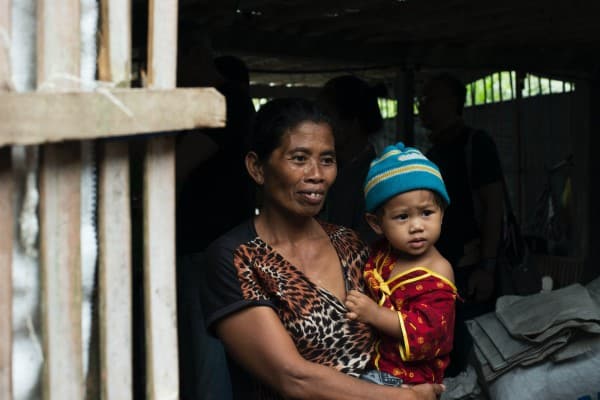This page contains affiliate links. This means if you a follow a link and make a purchase, at no additional cost to you, Humanitarian Careers will receive a commission. Thank you for supporting the site.
Studying a degree in humanitarian aid is one of the best ways to lay the foundations of a career as an international aid worker. Many leading university’s offer bachelors, master and PhD’s in humanitarian aid, providing the theoretical understanding and practical skills needed to work in humanitarian response.
Here we’ve put together the definitive list of humanitarian aid degrees around the world – from degrees covering the broad topics of humanitarian response to specialised degrees in humanitarian engineering and trauma sciences. Studying any of these degrees is a fantastic way to launch a career in international humanitarian action.
Bachelor of Humanitarian Aid and Development – Charles Darwin University
Charles Darwin University in Australia has a bachelor’s degree humanitarian in aid and development. The degree focuses on key theoretical elements of humanitarian response such as the sociology, ethics, community development and aid delivery. The degree also focuses on practical approaches to humanitarian response including relevant tools and methods. Students on the degree have a chance to gain first-hand experience in humanitarian aid through work placements and internships.
Entry requirements for the Humanitarian Aid and Development Degree at Charles Darwin University include the completion of high school education to Australian or international standards. Applicants also need to submit a written personal statement. Non-native English speakers require an IELTS score of 6.0 with no elements below 6.0.
Information on fees and scholarships for the Humanitarian Aid and Development degree at Charles Darwin University can be obtained from the university.
Bachelor of Humanitarian and Development Studies – Western Sydney University
Western Sydney University’s under-graduate degree in Humanitarian and Development Studies is highly relevant for those wanting to study humanitarian aid. The degree is developed directly with aid NGO’s working delivering humanitarian responses and aims for students to gain the practical skills needed for front-line humanitarian work. The degree is taught by experts in humanitarian aid from the United Nation and international NGOs. Students on the bachelor’s degree can also gain work experience in humanitarian aid through field research and internships.
Applicants to the Humanitarian and Development Studies bachelor degree at Western Sydney University are likely to have completed a high school education or international equivalent.
For the bachelor’s degree in Humanitarian and Development Studies at Western Sydney University, Australian students can receive support towards their tuition fees. International students pay around 26,240 AUD to study the Humanitarian and Development Studies bachelor degree at Western Sydney University. Western Sydney University has a wide range of scholarships available including the Merit Scholarship, Equity Scholarship and scholarships for refugees.
BSc International Disaster Management & Humanitarian Response – Manchester University
Manchester University offers a degree in Disaster Management and Humanitarian Response. Students on the degree get a deep understanding of the causes and impacts of humanitarian disasters, as well as learn the latest processes and practices of humanitarian response. The bachelor’s degree introduces students to the key theories underpinning contemporary humanitarian work. The degree in Disaster Management and Humanitarian Response at Manchester University also gives students the opportunity to gain valuable practical experience in humanitarian action through placements and field work.
UK applicants to the Manchester University under-graduate degree in International Disaster Management and Humanitarian Response require A level grades of AAB with at least one humanities subject. Applicants on the international Baccalaureate need to have 35 points overall, with 6,6,5 in higher level subjects. English requirements for the degree are an IELTS score 6.5 with no element below 6.5 or equivalent.
UK students pay fees of 9,250 GBP for the International Disaster Management and Humanitarian Response bachelor’s degree at Manchester University. International students pay fees of 19,500 GBP. Financial assistance is available for the degree for both UK and international students.
Disaster and Emergency Management BSc (Hons) – Coventry University
Coventry University has a humanitarian degree in Disaster and Emergency Management. The bachelor’s degree focuses on humanitarian responses for natural disasters, as well as complex emergencies such as conflicts and famines. Students on the Disaster and Emergency Management degree at Coventry University also focus on key elements of humanitarian aid such as disaster risk reduction and project management for humanitarian action. The undergraduate degree also covers important stages of the humanitarian project cycle including response and recovery, as well as future crises prevention or management strategies.
Entry requirements for the Disaster and Emergency Management degree at Coventry University for UK applicants are A level results of ABB – BCC. Entry requirement for international students can be found on the university’s website.
Tuition fees for UK students are 9,250 GBP. Fees for international students for the Disaster and Emergency Management degree at Coventry University are around 15,650 GBP. Financial assistance is available as loans to UK students.
Humanitarian Aid Online Courses
If you are looking to study humanitarian aid, we highly recommend the online course International Humanitarian and Development Careers. We think it provides one of the best overviews of the humanitarian sector and gives valuable insights for those searching for courses in humanitarian aid. Follow the link to the course’s page for more information.
The International Humanitarian Law Theory and Practice online course offered by Leiden University in the Netherlands provides a fantastic theoretical overview of humanitarianism. We think it’s one of the top online courses for those who want to understand the basics of international humanitarian law. Click the link to visit the course’s page for more information.
We also think the Humanitarian Action Response and Relief online course offered by Coventry University is a must for anyone looking to study humanitarian aid work. It only takes around three weeks to complete and would be a major addition to the application of anyone wanting to become an aid worker. The link is to the course’s page.
Humanitarian Studies – Fordham University
The Humanitarian Studies course at Fordham University in New York is one the top degrees in humanitarian aid. The degree covers the major impacts of disasters and conflicts on populations, as well as the worldwide impact of conflicts, diseases, poverty and human rights injustices. Students on the Humanitarian Studies degree at Fordham University develop a deep understanding of the tools and processes humanitarian experts need to respond to crises. The degree also allows for internships and field work with leading humanitarian aid NGOs.
Entry requirements for the Humanitarian Studies degree at Fordham University are likely to include the completion of a high school education or international equivalent. Non-native English speakers will also need to prove their English language ability.
Fees to study the Humanitarian Studies degree at Fordham University are 27,365 USD per term, or 54,730 USD per academic year. Fordham University has a wide range of scholarships for domestic and international students. Fordham University also has awards and grants for its degree students including Need-Based Grants, Fordham Tuition Award and the Metro Grant.
MSc in Humanitarian Programme Management – Bioforce
Bioforce is one of the most renowned learning institutions in the humanitarian sector. With over 35 years’ experience in training front line aid workers, Bioforce provides some of the most innovative and vital courses for humanitarians. Training with Bioforce is ideal for those already working in the aid sector who want to develop their career. It’s also one of the best places to learn for those looking to start a career in aid.
The MSc in Humanitarian Programme Management offered by Bioforce is one of the leading courses of its type. Students on the course learn the fundamentals of overseeing the delivery of humanitarian projects in the field. The course covers vital areas including the principles of humanitarian action, managing programmes and projects, human resource management, safety, security and logistics and programme finance and funding.
Students on the Bioforce MSc in Humanitarian Programme Management complete the course in seven months. The course is taught through a mixture of group exercises, real life simulations and practical field work. For those wanting to learn the practical skills needed to oversee humanitarian aid projects in the field, the Bioforce MSc in Humanitarian Programme Management is one of the top masters courses in the world.
Master in Human Rights and Humanitarian Action – Sciences Po
Sciences Po, in Paris, offers a degree in Human Rights and Humanitarian Action. The post-graduate degree provides students with a unique combination of instruction in human rights and humanitarian aid, ensuring a cross-cutting approach to the two fields. The 2-year master’s degree provides students with foundational knowledge of humanitarian aid. Students on the post-graduate degree are also encouraged to develop their leadership and analytical skills, whilst also gaining strong relevant humanitarian skills in advocacy, negotiation and project monitoring and evaluation.
Information on application requirements, fees and scholarships for the Human Right and Humanitarian Action master’s degree at Sciences Po should be sought from the university.
MSc International Development and Humanitarian Emergencies – London School of Economics
The London School of Economics (LSE) has a master’s degree in International Development and Humanitarian Emergencies. One of the top post-graduate degrees worldwide in humanitarian aid, the LSE master’s degree focuses on students understanding of the root causes of humanitarian emergencies and complex crises, as well as providing a theoretical foundation for tackling global inequality. The master’s degree at LSE also includes practical instruction in managing humanitarian aid projects, as well as allowing students to critique the impact of the current humanitarian system and address its major challenges.
The International Development and Humanitarian Emergencies master’s degree at LSE requires applicants to have 2.1 undergraduate degree or international equivalent.
Tuition fees for the LSE master’s degree in International Development and Humanitarian Emergencies are 15,216 GBP for UK students and 23,520 for overseas students. LSE has many scholarships available including the LSE Cities Scholarships and Bloomberg Scholarships for Public Service.
MSc Humanitarian Intervention by Distance Learning – University of East London
The University of East London offers a master’s degree in Humanitarian Intervention. The distance learning degree provides training in humanitarian aid and is aimed at those already working in the humanitarian sector, or wishing to join the aid industry. The master’s degree in Humanitarian Intervention in at University of East London combines operational trainings in humanitarian response with trainings in psychological support for those affected by crises and disasters. The master’s degree has been developed in conjunction with Save the Children, one of the leading humanitarian NGOs.
The Humanitarian Intervention by Distance Learning master’s degree at the University of East London requires applicants to have completed an undergraduate degree with at least a 2.2 result.
Both UK and international students pay 11,040 GBP to study the master’s degree in Humanitarian Intervention by Distance Learning at the University of East London. Scholarships are available including for asylum seekers and civil engagement, as well as alumni discounts and sports scholarships.
MSc Humanitarianism, Aid and Conflict – SOAS
The London School of Oriental and African Studies (SOAS) has a master’s degree in Humanitarianism, Aid and Conflict. The degree provides students with analytical training and thorough background understanding of the challenges faced by the humanitarian aid sector. Students on the master’s degree also cover the history and development of humanitarian aid, alongside learning the theoretical, conceptual, political and economic factors underpinning conflict, aid and humanitarianism. The SOAS post-graduate degree in Humanitarianism, Aid and Conflict also aims for students to engage is key humanitarian issues such as accountability, security and access.
Entry requirements for the master’s degree in humanitarianism, aid and conflict at SOAS are a minimum of a 2.1 undergraduate degree. However, relevant work experience may also be considered.
Tuition fees for the Humanitarianism, Aid and Conflict master’s degree at SOAS are 13,360 GBP for UK students and 22,840 for overseas students. SOAS has an extensive range of scholarships including for students from Africa, Asia, the Middle East and Latin America. They also offer the John Loiello AFSOAS FISH Scholarship.
Master of Arts in International Humanitarian Action – Fordham University
The master’s degree in International Humanitarian Action at Fordham University is one of the leading degrees in humanitarian aid. The master’s degree aims to educate the next generation of humanitarian leaders. Students on the master’s degree learn the tools and methods used in front-line humanitarian responses. Students also learn the theory underpinning humanitarian aid in conflict and disaster zones. The master’s degree in International Humanitarian Action challenges students to critique the current set-up of the humanitarian aid sector and develop innovative solutions to its current limitations.
Applicants to the in International Humanitarian Action master’s degree at Fordham University require the completion of an undergraduate degree. Related professional experience in humanitarian aid is also recommended.
Tuition fees for the master’s degree in International Humanitarian Action at Fordham University are 1,546 USD per credit unit. Financial assistance is available including Fulbright Scholarships, McNair Scholarships and discounts for Peace Corps volunteers.
Human Rights and Humanitarian Policy (Masters) – Columbia University
Columbia University, in New York, has a master’s degree in Human Rights and Humanitarian Policy. The specialised degree views human rights as an integral element to all international policy, and as a key foundational element of humanitarian responses. Students on the degree learn an interdisciplinary mixture of economic development, peace-building, conflict resolution, business development, and gender issues. On the master’s degree in Human Rights and Humanitarian Policy at Columbia University complete significant independent research humanitarian and human rights
Information for the master’s degree in Human Rights and Humanitarian Policy at Columbia University on application requirements, tuition fees and financial assistance can be obtained from the university.
MSc International Humanitarian Affairs (Online) – University of York
The University of York has a unique online master’s degree in International Humanitarian Affairs. The post-graduate degree explores the deep-rooted concept of humanitarianism, combined with investigations into the theory, policy and practice of humanitarian affairs. Students on the International Humanitarian Affairs master’s degree at University of York also explore how humanitarian affairs can be used as a basis to respond to disasters, conflicts and complex political emergencies. The online master’s degree offers modules including Education in Emergencies, Evaluating Humanitarian Programmes and Communities in Humanitarian Affairs.
The online master’s degree in International Humanitarian Affairs at University of York requires applicants to have an undergraduate degree with a minimum 2.1 result, or international equivalent. The university also states they will consider applicants with relevant humanitarian work experience. Applicants without English as a first language require an IELTS score 6.5 with minimum 6.5 in writing and 6.0 in all other elements.
For the International Humanitarian Affairs master’s degree at University of York, UK and international students pay fees of 5,060 GBP to study the degree. There are scholarships available, including the British Council Scholarships for Women in STEM (Americas), Equal Access Scholarships and GREAT Scholarships.
MA Humanitarianism and Conflict Response – Manchester University
The Humanitarianism and Conflict Response master’s degree at the University of Manchester is one of the leading humanitarian aid degrees. The degree provides rigorous education in both the practice and theory of humanitarian action. Students on the Humanitarianism and Conflict Response master’s degree at the University of Manchester work to analyse and understand the historical and contemporary view of humanitarian response, as well as critically evaluate the under-lying theories and assumptions of humanitarianism. Students on the master’s degree are also encouraged to critique current humanitarian and conflict responses to further build their understanding.
Entry requirements for the master’s degree in Humanitarianism and Conflict Response at Manchester University includes having a second class honours undergraduate degree or above. Non-native English speakers need an IELTS score of 6.5 to study the degree, or 93+ in the TOEFL iBT with a minimum writing score of 23.
Tuition fees to study the Humanitarianism and Conflict Response post-graduate degree at Manchester University are 10,000 GBP for UK students and 20,000 GBP for overseas students. Manchester University has a wide range of scholarships and financial assistance available.
Supply Chain Management with Humanitarian Challenges MSc – University of Huddersfield
Supply chain management is a fundamental part of successful humanitarian responses. The University of Huddersfield has a master’s degree in Supply Chain Management with Humanitarian Challenges focusing specifically on logistics support to aid programmes. The master’s degree allows students to gain a deep understanding of the technical aspects of humanitarian supply chain management, whilst exploring the unique challenges that logistics work in disasters and conflicts can bring. The master’s degree in Supply Chain Management with Humanitarian Challenges at the University of Huddersfield also provides a theoretical understanding of how supply chains operate within humanitarian contexts.
Entry requirements for the Supply Chain Management with Humanitarian Challenges master’s degree at the University of Huddersfield include a 2.2 bachelor ’s degrees or international equivalent. English language requirements for the master’s degree include an IELTS score of 6.0 with no elements below 5.5.
UK students pay fees of 8,900 GBP to study the University of Huddersfield’s master’s degree in Supply Chain Management with Humanitarian Challenges. International students should contact the university for details of fees. Loans, scholarships and bursaries are available to assist with funding the master’s degree.
Trauma Sciences (Military and Humanitarian) Online MSc – Queen Mary University
Queen Mary University offers one of the leading humanitarian health masters degrees. The Trauma Science (Military and Humanitarian) is practical medical degree focusing on the required trauma sciences to treat people affected by conflicts and humanitarian disasters. Aimed at those already medically qualified, the master’s degree provides students with hands-on training in medical practice for trauma survivors, as well as the chance to undertake individual research into trauma sciences and humanitarian action.
To study the Trauma Science (Military and Humanitarian) master’s degree at Queen Mary University requires an undergraduate degree in medicine, nursing or paramedic science. The master’s degree also requires a minimum of one year’s professional clinical experience in managing patients with traumatic injury.
Fees to study the Trauma Science (Military and Humanitarian) master’s degree at Queen Mary University are 6,700 GBP for UK students and 13,000 GBP for overseas students. Queen Mary University has a range of scholarship available, including The Derek Shuttleworth Educational Trust Scholarship, the QMUL Annual Fund Scholarship and the Sally Sainsbury History Scholarship.
Humanitarian Engineering MSc – University of Warwick
The University of Warwick offers a unique master’s degree in humanitarian engineering. The degree explores the connection between the mechanical sciences and humanitarian aid. Students learn how engineering can be used to improve humanitarian responses as well as how bad engineering design can increase the negative impacts of humanitarian crises. The master’s degree In Humanitarian Engineering the University of Warwick includes modules on Humanitarian Engineering: Ethics, Theory and Practices, Water and Environmental Management and Urban Resilience, Disasters and Data.
Entry requirements for the MSc Humanitarian Engineering masters at Warwick University is an upper-second class degree at undergraduate level. The undergraduate degree needs to be in either one of the sciences, a social science, natural science, law, health, management, business and economics or engineering. However, the university says serious applicants with other backgrounds can also apply. Applicants need to provide one academic reference and submit a statement of purpose of around 1 -2 pages. English language requirements for the master’s degree are an IELTS score of 6.5 with no part with a score below 6.0.
Fees for the MSc Humanitarian Engineering master’s degree at Warwick University are around 9,460 GBP for UK/EU full-time students and 4,730 GBP a year for UK or EU part-time students. Overseas students pay 21,280 GBP for full-time study and 10,640 GBP a year for part-time. Warwick University has a wide range of scholarships, including means tested awards for students from lower incomes.

Master’s Programme in Humanitarian Action and Conflict – Uppsala University
Uppsala University in Sweden offers a master’s degree in humanitarian Action and Conflict. The degree explores how humanitarian aid work is shaped by conflict as well as practical ways humanitarian organisations can work effectively in conflict zones. Alongside the fundamental theories and tools of humanitarian action, key parts of humanitarianism in relation conflict response are also explored. These include the ethical decisions humanitarians must make in conflict zones, as well as the principles of international humanitarian law.
Applicants to the master’s degree in Humanitarian Action and Conflict at Uppsala University include the completion of a bachelor’s degree. English language requirements to study the master’s degree include an IELTS mark of 6.5 with no section below 5.5.
Tuition fees for the Uppsala University master’s degree in Humanitarian Action and Conflict total 100,000 SEK. Information on scholarships and financial aid for Swedish and international students can be obtained from the university.
MSc Humanitarian Action – University College Dublin
The master’s degree in Humanitarian Action at University College Dublin is the top humanitarian degree in Ireland. The masters provides an in-depth investigation into the professional competencies needed for humanitarian work, as well as ensuring students have the practical skills necessary to operate in humanitarian responses. Students on the master’s degree also cover the theoretical background of humanitarian principles. The master’s degree in Humanitarian Action at University College Dublin also encourages students to develop a wide network of humanitarian professionals as well as completing significant research into humanitarian action.
Applicants to the Humanitarian Action master’s degree at University College Dublin include holding an upper second class under-graduate degree or international equivalent. Non-native English speakers need an IELTS score of 6.5 with no section below a 6.0.
Fees to study the University College Dublin master’s degree in humanitarian action are 9,000 EUR for EU students, and 24,200 for non-EU students. Information on financial support to assist with meeting the costs of the degree should be sought from the university.
International Humanitarian Action, Master – Ruhr-Universität Bochum
The Ruhr-Universität Bochum, in Germany, has a master’s degree in International Humanitarian Action. One of Germany’s top humanitarian masters, the degree aims to provide students high quality academic credentials and instruct up-coming humanitarian professionals. Combining theoretical and practical skills, the master’s degree in International Humanitarian Action is led by some of Europe’s top humanitarian aid professionals. Students on the International Humanitarian Action master’s degree at Ruhr-Universität Bochum can take modules including in Humanitarian action management, Humanitarian international law and International relations in humanitarian action.
Contact Ruhr-Universität Bochum directly for information on the entry requirements for the International Humanitarian Action master’s degree.
Tuition fees to study the master’s degree in International Humanitarian Action at Ruhr-Universität Bochum are 12,000 EUR. Information on financial aid and scholarship opportunities should be obtained from the university.
PhD Humanitarianism and Conflict Response – University of Manchester
The University of Manchester’s has one of the best-regarding post-graduate degrees in humanitarian aid. The PhD in Humanitarianism and Conflict Response allows students to complete a significant piece of individual research into an area of humanitarian aid. Students on the post-graduate PhD degree are encouraged to develop new perspectives on humanitarian aid and perform in-depth critiques of the current humanitarian system. Supported extensively by leading humanitarian professionals, students on the doctorate degree in Humanitarianism and Conflict Response at Manchester University also analyse and evaluate contemporary humanitarian actions.
Applicants wanting to study the PhD in Humanitarianism and Conflict Response at the University of Manchester need to have a bachelor’s degree graded 2.1 or above, or the international equivalent, in a related subject. Applicants also need a master’s degree with an overall average of 65% or higher, with a minimum of 65% in the dissertation and with no mark below 55% (or its international equivalent) in a related subject. Strong related humanitarian work experience will also be considered.
The doctoral degree in Humanitarianism and Conflict Response at the University of Manchester costs 6,250 per year for full-time UK students and 19,500 GBP for full-time overseas students. Part-time UK students pay 3,125 GBP per year. The University of Manchester has a range of scholarships on offer including the ESRC North West Social Science DTP (NWSSDTP) PhD Studentships in the School of Arts, Languages and Cultures, the President’s Doctoral Scholar (PDS) Awards in the School of Arts, Languages and Cultures and the China Scholarship Council Scholarship.
PhD in Humanitarian Studies – University College Dublin
University College Dublin offers a specialised post-graduate degree programme in Humanitarian Studies. A doctoral degree, students on the University College Dublin PhD in Humanitarian Studies complete extensive research into humanitarian aid work, its impacts, challenges and contexts. Supervised by some of the top humanitarian academics, students on the doctoral degree in Humanitarian Studies at University College Dublin complete literature and practical field work to develop unique and insightful research into humanitarian aid.
Information on entry requirements and fees for the PhD in Humanitarian Studies at University College Dublin should be sought from the university directly.
If you want to learn more about how to become a humanitarian worker, explore our list of the top humanitarian aid online courses here.





